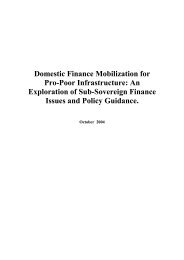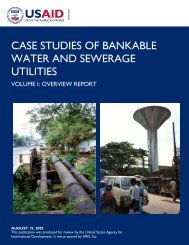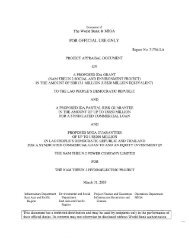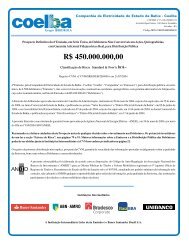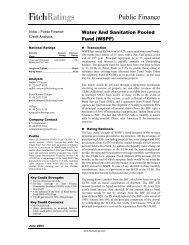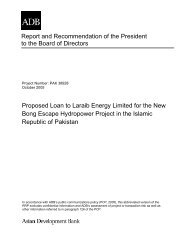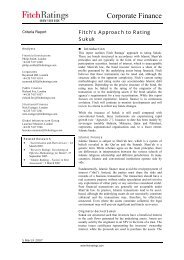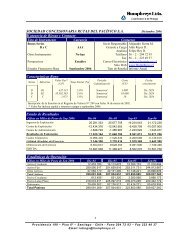S&P - Public Finance Criteria (2007). - The Global Clearinghouse
S&P - Public Finance Criteria (2007). - The Global Clearinghouse
S&P - Public Finance Criteria (2007). - The Global Clearinghouse
Create successful ePaper yourself
Turn your PDF publications into a flip-book with our unique Google optimized e-Paper software.
Charter Schoolsstates are not always determined on a per-pupilbasis. Other financial factors include:Operating historyInvestment-grade rated charter schools will likelyhave a stable financial operating history, preferablyfor at least three years.Fund balanceFund balance reserves are critical due to charterschool reliance on enrollment for funding.Enrollment can, and does, fluctuate, while fixedcosts may not. Standard & Poor’s examineswhether there is a formal fund balance policy basedon cash flow requirements, and if the school successfullyadheres to such policies.Financial flexibility<strong>The</strong> ability to reduce budgets, if necessary, also contributesto financial flexibility in the event of anunexpected downturn in enrollment, as do conservativebudgetary policies. Standard & Poor’s routinelyasks charter schools how they wouldmaintain a balanced operating budget if enrollmentdipped or state funding were delayed or reduced. Inthis respect, low class sizes provide some flexibilityto increase student-to-teacher ratios and cut costs.General financial policiesAdequate casualty insurance is advisable since charterschools often use a single site facility. Existenceof long-range financial and facilities planning, andformalized policies relating to fund balance andcash flow reserves are also positive managementand financial factors.Audits and financial reportingWhile Standard & Poor’s strongly prefers independentaudits, we have rated schools that are presentedas a component unit of a school district that is alsothe authorizer. Availability of independent audits—at the charter school level—may be a critical ratingfactor. Uniform financial reporting is important forfiscal accountability and also factors into charterrenewal decisions.Cash managementCash management policies and procedures areimportant. <strong>The</strong> frequency and timing of payments tocharter schools throughout the year varies by state,which may affect daily cash flow. Banking relationsmay also be reviewed when access to liquiditybecomes important due to modest cash reserves,since cash flow requirements can be uneven. Whilesome states have provisions to accelerate funding tocharter schools that can alleviate cash flow issues,other states have no such provisions.Renewal and replacement reservesExistence of a formal reserve for future renewal andcapital expenses that is funded within the operatingbudget each year is considered a positive credit factor.<strong>The</strong> establishment of such a reserve with fundingup-front or through required payments overtime may strengthen credit security.Endowment/fundraisingIs there an established endowment or fundraisingprogram? <strong>The</strong> existence of such a program maycontribute to financial flexibility. Conversely, isthere a dependence on fundraising to support programscrucial to attracting students to the school?Management And AdministrationManagement factors are a critical part of charterschool review and will be a pivotal factor in determiningif a school is investment grade. Standard &Poor’s considers the history of charter school establishment.Biographies of key staff members mayindicate the depth of the management team. Keystaff should have solid experience in financial managementin addition to the expected academic/educationalcredentials, or an experienced managementcompany or public school district staff should providesuch expertise. Charter school management isexpected to have, or obtain, construction managementexpertise, as needed. In situations where thesuccess of the charter school is closely tied to thecharisma and personality of a founder, successionplanning is necessary to ensure ongoing viability ofthe school.Private management contracts are not uncommon.This is generally credit-neutral as long as themanagement company is experienced and the termsof the management contract do not adversely affectbondholder repayment. <strong>The</strong>re should be policies inplace to maintain operations in case a managementcompany resigns or is fired.Details about the budgeting process are importantfinancial management issues, and Standard &Poor’s checks to see if management has been generallyaccurate in its enrollment and cost projections.Information regarding teacher recruitment is alsoimportant, as well as teacher certification, salaryscale comparisons with the local school district andcompeting charter schools, how teachers arerecruited, certification requirements, comparativesalary scale, and turnover.Debt And Capital PlanningMany state statutes specifically authorize charterschools to issue debt. <strong>Public</strong> capital financing forcharter schools, however, is in its infancy comparedto other municipal rating sectors. Many states havewww.standardandpoors.com197



